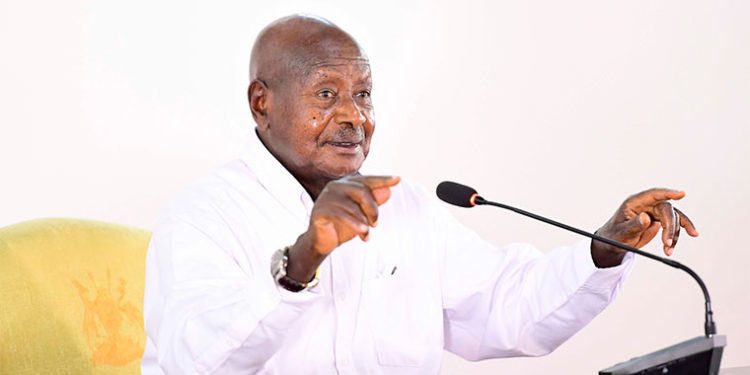By THE OBSERVER UG
President Yoweri Museveni
As 2023 came to a close, President Museveni took the opportunity in his End-of-Year speech from Rwakitura to reflect on Uganda’s progress and outline key priorities for the year ahead, 2024.
One of the central themes of President Museveni’s address was the importance of wealth creation within households. He reiterated that there are four main sectors crucial for both wealth and job creation in Uganda. The president stressed the significance of commercial agriculture, distinguishing between intensive and extensive farming practices.
He emphasized the need for high-value activities even on a small scale. Notably, he highlighted seven key enterprises: coffee, fruits (mangoes, oranges, pineapples, apples, grapes), zero-grazing dairy farming, fish farming, poultry for egg production, piggery, and homestead food crops such as cassava and bananas.
President Museveni cited success stories of individuals and communities who have implemented these practices and are now thriving. President Museveni pointed out that both intensive and extensive agriculture were essential for Uganda’s prosperity. Extensive agriculture, focusing on crops like maize and soybeans, is critical to support intensive agriculture.
He argued that large-scale cultivation of low-value crops could be highly profitable. For instance, one acre of maize can yield up to Shs 4 million in a year, and scaling up to 100 or even 1,000 acres can lead to substantial earnings. The president also highlighted the significant growth in various sectors of the Ugandan economy.
Coffee production had surged to nine million bags, up from two million bags in 1986. Milk production reached an impressive 5.2 billion liters, compared to two million liters in 1986. The cattle population also increased from three million in 1986 to a remarkable 16 million.
Furthermore, tea production had risen to 60 million kilograms from just three million kilograms in 1986. President Museveni discussed the expansion of the industrial sector, which now boasted 8,617 factories employing 829,668 people. He acknowledged the challenges posed by corruption and bribery, which sometimes hindered entrepreneurs from obtaining necessary licenses or land for their factories.
He emphasized the government’s commitment to lowering production costs, including electricity, water, transportation, and access to affordable credit, to ensure Uganda’s products remained competitive both domestically and in export markets.
The president reiterated the government’s long-standing goal of shifting people from agriculture to industry and services. He argued that agriculture, which engaged a significant portion of the population, was characterised by low productivity. President Museveni cited the example of tractors capable of plowing 1,200 acres in a single season.
With 40 million arable acres in Uganda, the potential for increased efficiency and job creation through mechanized farming was immense. President Museveni discussed efforts to empower the youth with valuable skills. He had established 18 skilling hubs across the country, offering training in various fields such as carpentry, metalwork, shoemaking, and motor mechanics.
Plans were in place to expand these hubs to include textile technology, ceramics, and ICT, in addition to the existing technical colleges. The president also mentioned the availability of financial support, such as the Emyooga funds, to assist skilled youth after their training.
The services sector, which included transport, hotels, tourism, and professional services like law, medicine, engineering, preaching, and music, had experienced substantial growth. It currently employed 4.14 million people. President Museveni acknowledged the need to address certain aspects of the sector, such as assisting musicians in recording and protecting their intellectual property through copyright laws.
The president touched on the rapid expansion of the Information and communications technology (ICT) sector, which was now employing 2.3 million people in both direct and indirect roles. He highlighted the potential for growth through Business Process Outsourcing (BPO), where Ugandans could provide services to companies abroad, such as bookkeeping for American or Canadian firms. President Museveni cited India, where the BPO sector employed 10 million people and generated $51 billion in revenue.
Turning to the issue of corruption, President Museveni acknowledged that it was primarily a problem among those with access to power and public funds. However, he assured the public that measures were in place to combat corruption, emphasizing that the corrupt were in the minority.
The president urged vigilance and encouraged citizens to report corrupt practices. President Museveni emphasized the importance of regional integration for prosperity. He recounted a recent decision to reject the idea of banning Tanzanian rice.







Discussion about this post